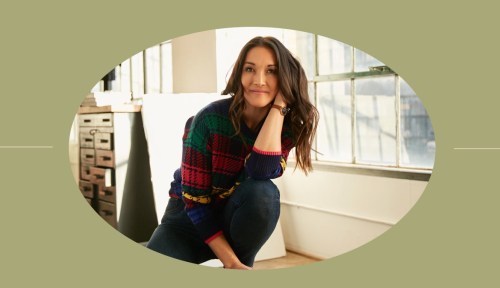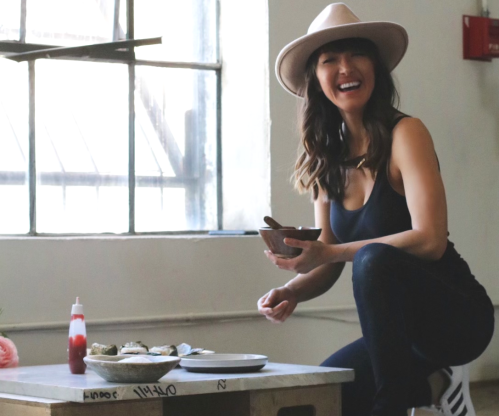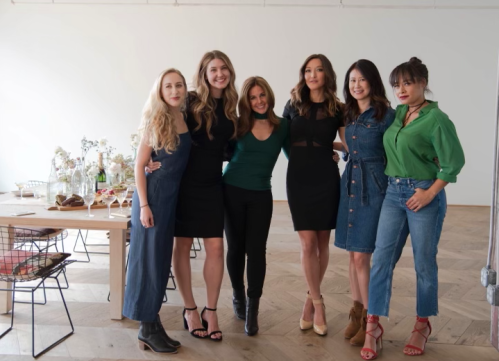Our editors independently select these products. Making a purchase through our links may earn Well+Good a commission
As an Asian American Woman, I’ve Had to Write My Own Rules for Success—Here’s What I’ve Learned
Chef, television host, and author Candice Kumai shares the lessons she's learned gaining success as an Asian American woman.

Climbing the career ladder is rarely a uniformly smooth and easy process—for anyone. But for marginalized women, the climb is often more challenging than it should be. I speak from experience; as an Asian American, I’ve felt like the odds were stacked against me. When I started my first business 14 years ago, in 2007, the fields I was trying to break into (food and media) were crowded and dominated by men; often, I was the “only” one in the room—the only woman, the only Asian American.
Those early years were tough. I faced a lot of rejection; I was told that I was too this and not enough that. But I had vision and perseverance on my side, and I was willing to be broke if it meant pursuing the kind of work I found meaningful. It took time, but today, I’m the author of six best-selling books, and I write, direct, and produce content for myself and others.
And the world is changing now, too. While I feel that I (like many women) was once denied a platform and the opportunity to share my experiences, the landscape is now evolving to not just “allow” but actively welcome and support marginalized voices. But that doesn’t mean “making it” in this country is easy—for anyone, but particularly for underrepresented groups.
If I’ve achieved success, it hasn’t been by following the usual rules. What I’ve learned over the past decade and a half is to create my own rules. Here are four things I’ve discovered that have helped get me where I cam today.
It’s okay to be different
Back in California, my hometown state, my sister and I practiced Japanese, dressed up in kimono with my mom for special occasions, and celebrated cultural holidays. I loved it. But at school, where we were the only Asian students, we stood out and we were teased—and standing out was not easy. Later in life, my older sister confessed that she was studious because she never wanted to draw attention to herself. But why? Because we knew we looked different, and some kids made sure we never forgot it. My joy of being Japanese was almost destroyed by their cruelty and ignorant name-calling.
My joy of being Japanese was almost destroyed by their cruelty and ignorant name-calling.
Fortunately, I’m now deeply proud of and in touch with my Japanese traditions. In fact, a large part of my career involves exploring and sharing my Japanese heritage on shows, streamers, magazines, and in books. But that early experience at school left a lasting imprint.
First, it taught me never to judge someone based on the way they look. It also reminded me of the power of gaman, a Japanese word meaning “with great resilience.” It makes me think about the Japanese-Americans who were placed into internment camps during World War II. From them, I gather strength, grace, and courage—and the will to move forward even when I’m in an unjust situation. I also know, deep down, that being different is its own special strength.
Preparation creates opportunity

As an Asian American woman, I too often had to fight for opportunities that others were handed. And so, I knew it was imperative that I learn real skills that would give me an edge in my chosen fields. Cooking was essential, so I enrolled myself into culinary school just after college at 22. From there, I paid my dues as a line cook at multiple restaurants and started picking up television hosting opportunities. I also took loads of free writing gigs so that I could get feedback from editors, and therefore become a strong enough writer to land the paid magazine jobs. Whenever opportunity knocked, I felt confident answering the call because I’d done the work. And the more work I did, the more opportunities seemed to pop up.
What’s interesting, though, is that none of this work really felt laborious. Writing, cooking, and connecting with my audience was the greatest gift and pleasure in the world for me. And through that, I discovered that cooking on camera was a skill that came naturally to me. It didn’t turn into a paycheck right away, but after 14 years, it wound up paying my bills and giving me a career that I had only dreamed of.
Pivot, pivot, pivot
My career didn’t take the path I’d imagined it would. Instead, it zigged and zagged, and I’ve had to adapt to change over and over again. I’ve learned that there are infinite routes to success. For instance, I never got my own food show, regardless of talent, experience, or skill. I was constantly the last one they’d always say no to. Consistently close to the cut, yet never making the final spot. Fifteen years of rejection!
And actually, that’s okay. Not getting a pre-written, cheesy food show allowed me to be gritty, creative, and legit. I taught cooking classes at the Brooklyn Kitchen. I wrote for every publication I could write for. I made $100 here, $200 there. I learned to manage my savings, my business accounts, and my own career with what little I had (and lots of support from a wonderful team and financial professionals, when needed). When I got another “no thanks” from TV, it only fueled my drive to write, direct, and produce. (Eventually, I sold my first series to a network, and it’s won more than eight awards already.)
Mastering the pivot made me resourceful, more creative, and more independent. In a twist, it also set me on top of some others who did get their own shows in my space. I had a long and noteworthy CV, and most of all, I had respect because I’d put in the work.
Sisterhood is powerful

Nobody, and I mean absolutely nobody, achieves success alone. When I look at my own career, I’ve learned the most from my female mentors, colleagues, and bosses. I’m so grateful to them, so forgive me for shouting them out now!
As women, my first book editor, Pam Krauss, and my first publisher Karen Rinaldi (who also published the great Anthony Bourdain’s first books), were able to relate to my experiences and career path in ways I don’t think a man fully could. Jasmin Allen, a brand director, gave me an opportunity that changed my whole career—it took another marginalized woman to give me that shot. My three best friends from New York—Jennelle Hamilton, Alyssa Faden, and Molly Loven—all work in top-level PR, and from them, I’ve picked up this wisdom: Stay focused professionally on the work you do best, and surround yourself with women that uplift you. In Japanese culture, we learn simply by watching others, not by listening to what they say, and watching all these women work was invaluable for me.
When my business began to really grow, I knew I wanted to work with other ambitious women. I trained some badass, professional ladies in New York and together, we did it all: published books, threw launch parties, wrote, produced, and directed shows, signed over 100 top branding deals, and learned so much in the process. We’ve also had to hop subway turnstiles in heels while holding cookie trays, but that’s a story for another day. My point is, finding my “team”—at every step of my career—has helped me navigate whatever challenges have come my way. Be good to your girlfriends and female colleagues because they are the ones who will be toasting with you alongside your unique journey to success.
Oh hi! You look like someone who loves free workouts, discounts for cult-fave wellness brands, and exclusive Well+Good content. Sign up for Well+, our online community of wellness insiders, and unlock your rewards instantly.
Sign Up for Our Daily Newsletter
Get all the latest in wellness, trends, food, fitness, beauty, and more delivered right to your inbox.
Got it, you've been added to our email list.








